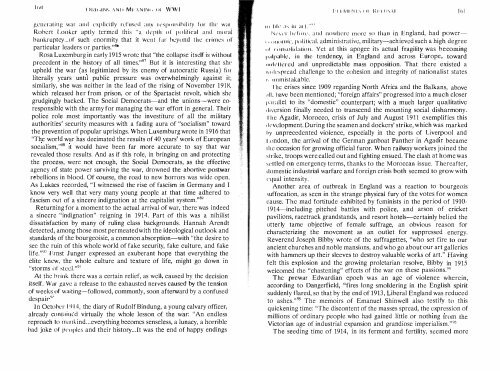CONTENTS - ouroboros ponderosa
CONTENTS - ouroboros ponderosa
CONTENTS - ouroboros ponderosa
Create successful ePaper yourself
Turn your PDF publications into a flip-book with our unique Google optimized e-Paper software.
Irll)<br />
()Il( ilN.\ .'\NI ) MI :\ NINI . 1)1 W\VI<br />
generat ing war tllld explicitly refused alloV Il's [ le Jl1.sihi[dy for till' W;II<br />
Rohrt l.ooker aptly termed this "a depth or political ;tIld moral<br />
hankruptcy ... of such enormity that it wnt far hcyond the crillls of<br />
particular leaders or parties.""<br />
Rosa Luxemburg in early 1915 wrote that "the collapse itself is without<br />
preccdent in the history of all times."" But it is intcresting that sh('<br />
upheld the war (as legitimized by its enemy of autocratic Russia) for<br />
lIterally years untIl public pressure was overwhelmingly against it;<br />
similarly, she was neither in the lead of the rising of November 191X.<br />
which released her from prison, or of the Spartacist revolt. which she<br />
grudgingly backed. The Social Democrats-and the unions-were co<br />
responsible with the army for managing the war effort in general. Their<br />
police role most importantly was the investiture of all the military<br />
authorities' security measures with a fading aura of "socialism" toward<br />
the prevention of popular uprisings. When Luxemburg wrote in 1916 that<br />
"Thc wor war has decimated the results of 40 years' work of European<br />
SOCialism,<br />
8<br />
It would have been far more accurate to say that war<br />
revealed those results. And as if this role, in bringing on and protecting<br />
the process, werc not cnough, the Social Democrats, as the effective<br />
agency of state power surviving the war, drowned the abortive postwar<br />
rebellions in hlood. Of course, the road to new horrors was widc open.<br />
As Lukacs recorded, "I witnessed the rise of fascism in Germany and I<br />
know very well that very many young people at that time adhered to<br />
fascism out of a sincere indignation at the capitalist system.""<br />
Returning for a moment to the actual arrival of war, there was indeed<br />
a sinccre "indignation" reigning in 1914. Part of this was a nihilist<br />
dissatisfaction by many of ruling class backgrounds. Hannah Arendt<br />
detected, among those most permeated with the ideological outlook and<br />
standards of the bourgeoisie, a common absorption-with "the desire to<br />
sec the ruin of this whole world of fake security, fake culture, and fake<br />
life."'" Frnst J unger expressed an exuberant hope that everything the<br />
elIte knew, the whole culture and texture of life, might go down in<br />
"storms of stcd."91<br />
At the "rink therc was a certain relief, as well, caused by thc decision<br />
.<br />
Itself. War gave a release to the exhausted nerves caused by the tension<br />
of weeks of waiting-followed, commonly, SOon afterward by a confused<br />
despair .".'<br />
In Octohn 1 'i t 4, the diary of Rudolf Bindung, a young calvary officer<br />
already cont"ill"" virtually the whole lesson of the war: "An endles<br />
reproach to 1I1,,"kind ... everything becomes senseless, a lunacy, a horrible<br />
bad joke of I"'opies and their history .. Jt was the end of happy endings<br />
l'I I'I\·lI'N I: ( )j' 1':1 1' 1 1..., .. \1<br />
ill 11k :,-.; ill ;11 1 ,,'H<br />
NeVI'l" hdoelrl,:, ;Jilt! Ilowhere more so than in England, had powcr<br />
I I 'Illomit', pi )[ilical, administralive, military-achieved such a high degree<br />
"I ('nllsoliti;tlitHl. Yet at this apogee its actual fragility was hecoming<br />
I,.,tpahk, in the tendency, in England and across Europe, toward<br />
""kttered and unpredictable mass opposition. That thcre existed a<br />
Widespread challenge to the cohesion and integrity of nationalist states<br />
I', tlllmistakahlc,<br />
Til crises since 1909 regarding North Africa and the Balkans, above<br />
.011. have been mentioned; "foreign affairs" progressed into a much closer<br />
l''Ir;dlcl to its "domestic" counterpart; with a n; ueh la ger qualitative<br />
diversion finally needed to transcend the mounting SOCial disharmony.<br />
Ihe Agadir, Morocco, crisis of July and August J 911 exemplifies this<br />
,kvdopment. During the seamen and dockers' strike, which was marked<br />
I,y unprecedented violence, especially in the ports of Liverpool and<br />
t.ondon, the arrival of the German gunboat Panther In Agadlf became<br />
llie occasion for growing official furor. When railway workers joined the<br />
strike, troops were called out and fighting ensued. The clash at home was<br />
settled on emergency terms, thanks to the Moroccan issue. Thereafter,<br />
domestic industrial warfare and foreign crisis both seemed to grow with<br />
('qual intensity.<br />
' .<br />
Another area of outbreak in England was a reachon to bourgeOIs<br />
suffocation, as seen in the strange physical fury of the votes for women<br />
cause. The mad fortitude exhibited by feminists in the period of 1910-<br />
1914-including pitched battles with police, and arson of cricket<br />
pavilions, racetrack grandstands, and resort hotels-ce : tainly belied the<br />
utterly tame objective of female suffrage, an obvIOUS reason for<br />
characterizing the movement as an outlet for suppressed energy.<br />
Reverend Joseph Bibby wrote of the suffragettes, "who set fire to our<br />
ancient churches and noble mansions, and who go about our art galleries<br />
with hammers up their sleeves to destroy valuable works of art." Having<br />
felt this explosion and the growing proletarian resolve, Bibby in 1915<br />
. 94<br />
h<br />
welcomed the "chastening" effects of the war on t ese passions.<br />
The prewar Edwardian epoch was an age of violence wherein,<br />
according to Dangerfield, "fires long smoldering in the English spirit<br />
suddenly tlared, so that by the end of 1913, Liberal England was reduced<br />
to ashes."" The memoirs of Emanuel Shinwell also testifY to this<br />
quickening time: "The discontent of the masses spread, the expression of<br />
millions of ordinary people who had gained little or nothmg from the<br />
Victorian age of industrial expansion and grandiose imperialism.""<br />
The seeding time of 1914, in its ferment and fertility. seemed more






